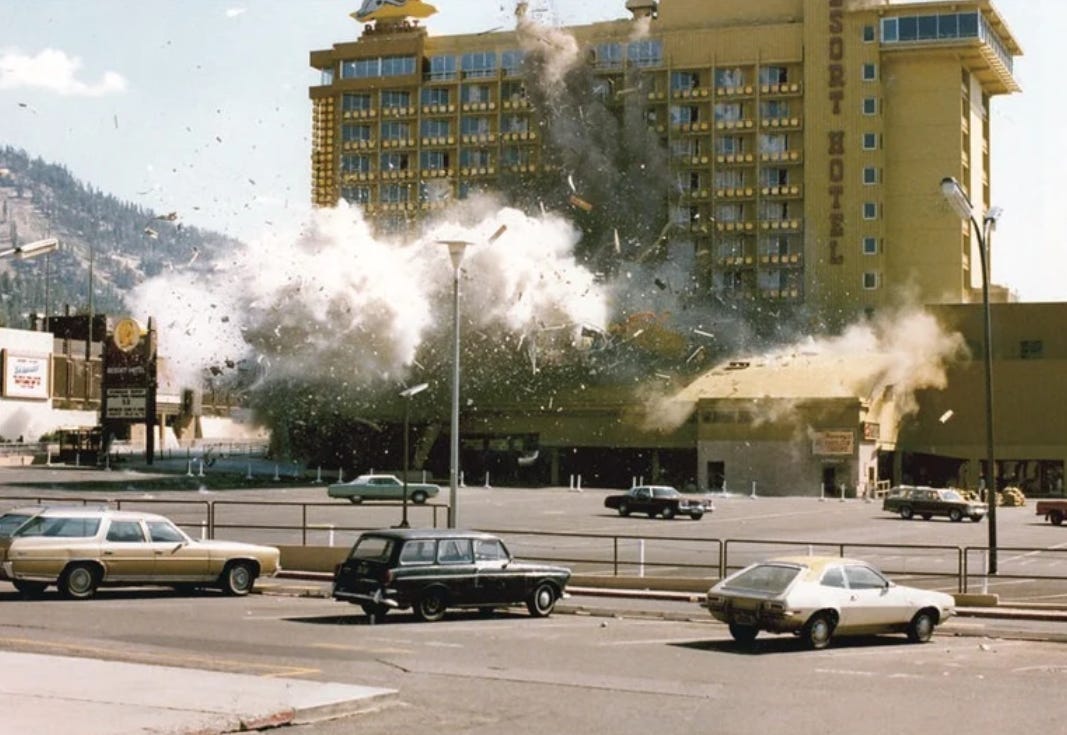Dean Koontz Had to Leave Nevada Because He Witnessed a Crime
And the ethics of wanting to know details he doesn't want to reveal.
1.
I’ve been reading a biography of Dean Koontz.
At one point, the biographer says that Dean and his wife Gerda lived in Las Vegas between 1974—75 but had to leave after one year.
“I was in the wrong place at the wrong time,” says Dean, “and I witnessed a major crime.” The investigation moved slowly, and given the nature of the crime and the way everyone in that town seemed to know everyone else, Dean and Gerda decided they would feel safer somewhere else. Their friends hated to see them leave, but agreed that they should.
After a few pages I couldn’t get it out of my head.
So I emailed the biographer.
2.
I said, “May I ask what that [crime] was?”
The biographer wrote back a day later. They said that if it’s not in the book, it’s for one of two reasons: either they didn’t know the answer, or Dean Koontz did not want it mentioned.
The biographer said that they were respectful of his wishes at the time, and remain so.
In other words, “You may not.”
3.
The biographer’s implication was that I was being indiscreet or invasive of Dean Koontz’s privacy; the implication is that I maybe think so little of her integrity that I’m assuming she’ll betray her subject’s trust; the implication is that the deliberate ambiguity of that passage should convey the fact that Dean Koontz wants these details to remain private, and a decent reader would honor that.
The email made me feel pretty terrible for most of the evening.
I’ll concede that, here too, this biographer has proven an effective writer.
4.
OK but walk with me through the ethics here and let me know where you land:
I am one of, let’s say, “relatively few” people who are so interested in the life of crime writer Dean Koontz that I bought, and am currently reading, a book about the life of crime writer Dean Koontz.
Now imagine that you are the first official biographer of crime writer Dean Koontz. In the middle of that book you tease the reader with some vague details of a life-changing CRIME in the life of crime writer Dean Koontz?
Is it tasteless or unexpected that I, a member of that specific readership to which this book is targeted, should follow up and ask for details?
5.
On the other hand:
If I like this author so much that I’m reading his biography, shouldn’t I also be respectful enough to recognize that he doesn’t want to talk about it, and thus leave it alone?
And yet! Even if this biography had been written without his consent, even if it had been written directly against his wishes, I would likely have read it anyway, and enjoyed it.
6.
If you don’t want anybody to know the nature of the crime you witnessed, why would you tell it to your biographer?
More specifically, why would crime writer Dean Koontz—who is famously gifted at crafting of suspense/intrigue—instruct his biographer to recount that crime in a vague and titillating way?
I once read a book in which the entire downward existence of humanity is predicated upon God telling two very-average people that they can have everything in the universe entirely to themselves except for one thing. That one thing is knowledge.
Guess how it ends.
7.
Let’s say that you are an honorable person, and you know a secret about another honorable person; the reason you know this secret is because that honorable person took note of how honorable you are and said, “I trust you to honor my secret.”
If I ask you to share it with me, am I insulting your honor, or simply curious?
If a car seller offers me one price, and I suggest a lower one, am I implying that they don’t deserve that much money, for their efforts? Am I implying that the item they’re selling isn’t worthwhile?
Or am I simply making my best offer against their best offer?
8.
The analogy here might be this: It isn’t that I’m questioning your loyalty to your subject so much as I’m wondering if the 30 years that’ve elapsed since the biography came out, and the 50 years that’ve elapsed since the crime was witnessed, might have diluted the NEED for such loyalty.
This is what I’m telling myself. In the mirror.




" witnessed" a crime... Sure, Deano.
I've actually seen a documentary about the bombing. Maybe this is the crime you're looking for.